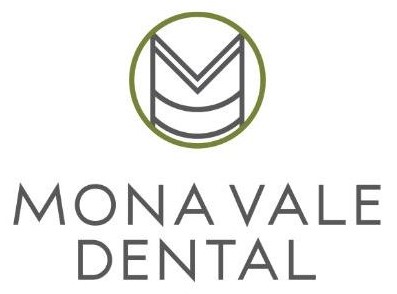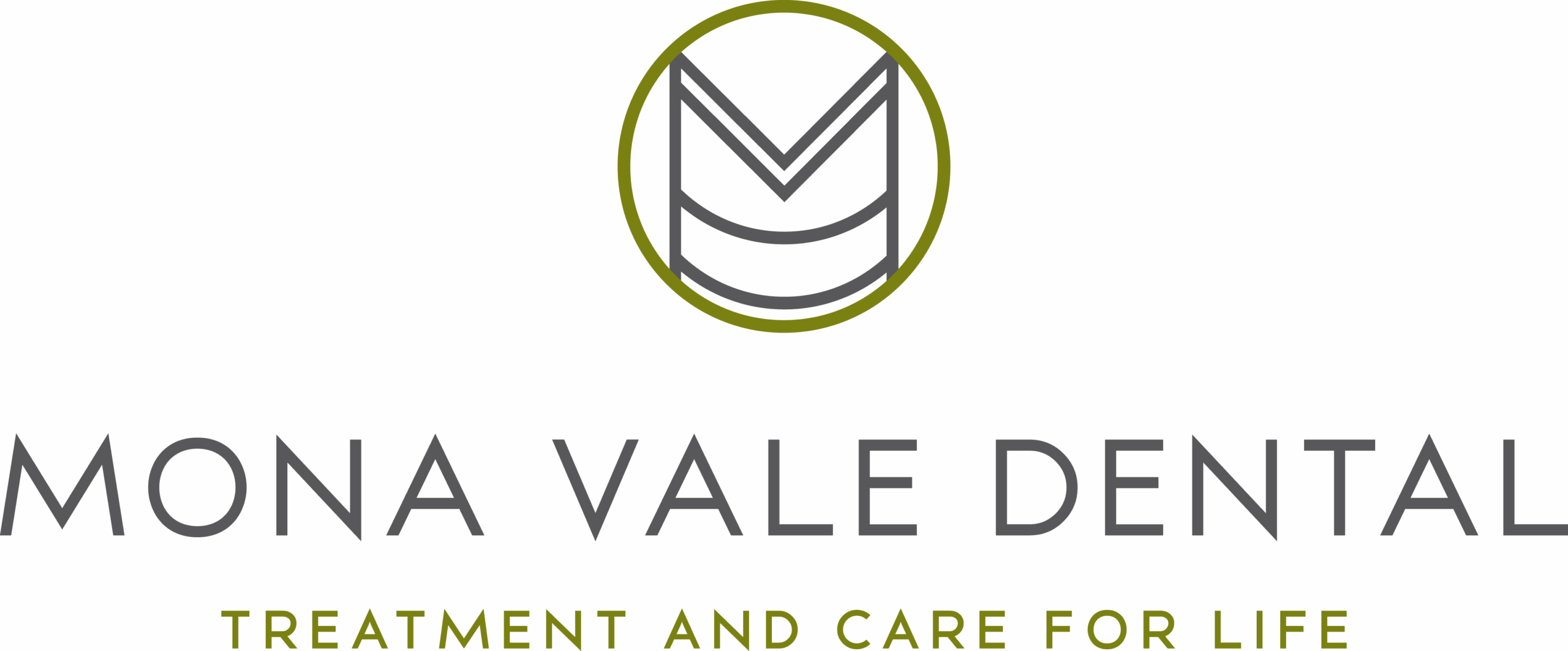It’s harder for people with high blood pressure to medicate their condition when they have gum disease, according to new research. We can reduce our chances of developing serious heart problems by taking better care of our mouths.
Gum disease doesn’t cause heart problems – not directly, anyway.
But there is a link between the two – strong enough for some doctors to urge their cardiovascular patients to take better care of their teeth, if they want to protect their hearts.
There’s a fair amount of research connecting poor oral hygiene to any number of health problems, including hypertension (high blood pressure).
What’s more:
New findings show that gum disease makes blood pressure medication less effective.
The take away from this?
It’s in your best interest to look after your oral health, especially if you’re taking medication to lower your blood pressure.
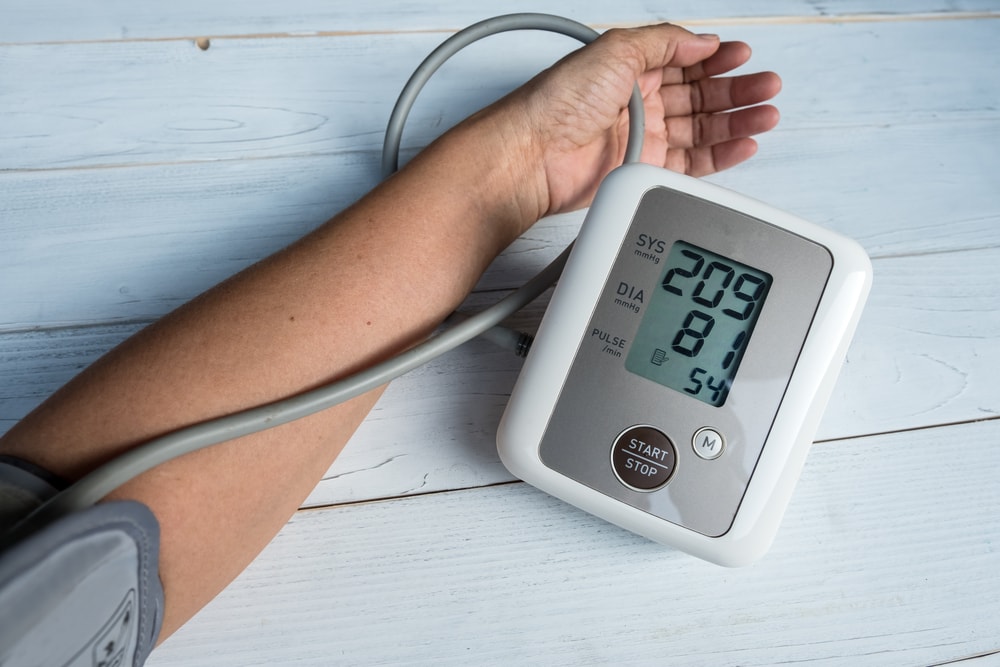
What is hypertension?
Hypertension refers to high blood pressure.
In Australia, blood pressure is classified as high if the reading exceeds 140/90 mmHg. Shockingly more than one third of Australians over the age of 18 fall into this category!
If you have raised blood pressure and do nothing about it, you’re at greater risk of:
- Heart failure
- Stroke
- Coronary heart disease
- Aneurysm
- Metabolic syndrome
- Dementia
- Kidney disease
- Erectile dysfunction
- Peripheral artery disease
- Hypertensive retinopathy
- Diabetes
Around 7.5 million people around the world die every year as a result of complications that occur when elevated pressure weakens vessels and blocks blood flow to vital organs.
Adults should ask their doctor to check their levels every two years, at the very least.
Thankfully, there are ways to manage hypertension, including diet changes, exercise and medication.

What does blood pressure medication do?
There are many types of blood pressure medications, also known as anti-hypertensives. These prescriptions are designed to bring your blood pressure under control, by lowering it.
They work in different ways, such as:
- Increasing the amount of urine your body produces, which lowers the volume of blood
- Stopping the body from tightening vessels
- Slowing the heartbeat and reducing its strength
- Relaxing the muscles around the blood vessels
Not everyone with high blood pressure needs to take medication; it depends on their doctor’s advice.

Blood pressure medication is less effective for patients with gum disease:
It’s harder for people with hypertension to lower their blood pressure with medication when they have gum disease, compared to cardiac patients with good oral health. This is according to new findings by the American Heart Association.
Researchers put the medical and dental records of more than 3600 people with high blood pressure under the microscope.
The results?
Blood pressure ranges of those with periodontal disease were 20 per cent more likely to be abnormal, across all age groups.
On the other hand:
People with healthy gums responded better to medication designed to manage hypertension. Their blood pressure levels were 2 to 3 mmHg lower than those with periodontitis, on average. Researchers went into the experiment suspecting there’s a link between cardiovascular disease and oral health, but even so, the results surprised them.
Dr Davide Pietropaoli from San Salvatore Hospital told Reuters Health:
“Recent literature suggests that poor oral health is associated with several highly prevalent conditions, such as cardiovascular diseases, diabetes, stroke, and obesity, and that it is related with increased mortality.”
However, what we didn’t know and surprises us is that a condition known as periodontal disease can affect the efficacy of medications for high blood pressure.
The team is waiting for the results to be confirmed by dedicated trials, but they believe that taking care of periodontal disease could help to lower blood pressure.
Patients with treated high blood pressure may benefit from a dedicated program for the reduction of oral inflammation from periodontal disease by referring to a dentist or periodontist.
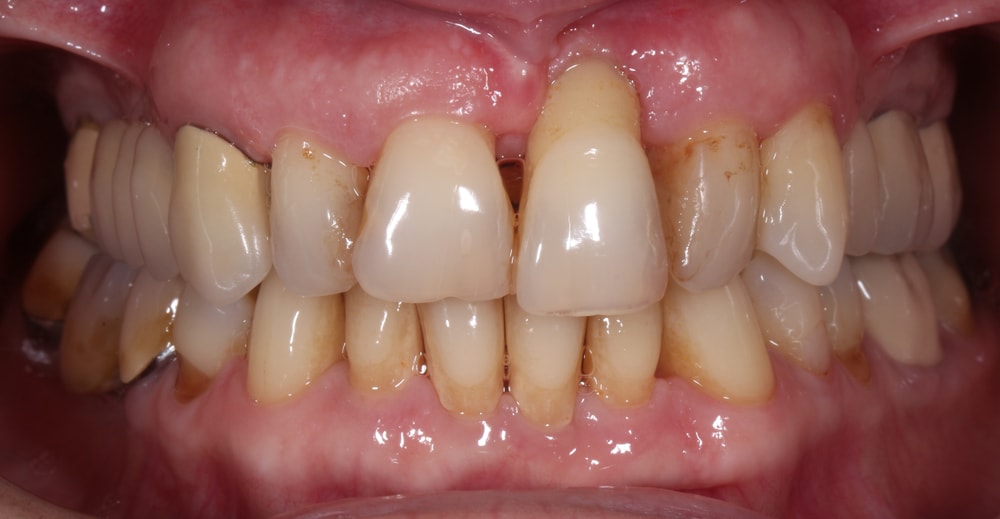
What is gum disease (periodontitis)?
Periodontitis is the worst form of gum disease. This chronic inflammatory disorder rears its ugly head when tissues surrounding the teeth become infected.
Small spaces form between the teeth and gums, trapping debris and spreading bacteria below the gum line. This causes gum tissue and bones to deteriorate to the point that teeth can no longer be held in place.
In Australia, gum disease is common in 35 to 53 per cent of adults over 45 years of age.
Signs and symptoms of periodontitis include:
- Swollen, bleeding or inflamed gums that are sore
- Small pockets (2-3mm) around the teeth
- Foul taste in mouth and continuous bad breath
- Loose or wobbly teeth
- Tenderness or pain when eating
- Losing teeth
- Thick, yellow fluid or pus on gums
- Teeth look longer due to receding gums
How to treat gum disease:
Dentists can reverse mild cases of gum disease and get rid of hardened plaque with mouth rinses and deep-cleaning treatments. Prescribed antibiotics can help to treat more serious cases. Sometimes this isn’t enough and dental surgery is needed.
Treatment for periodontitis usually works well, if the condition is detected in time.
But it’s in your best interest to avoid going down this path in the first place. Prevention should be your main goal.
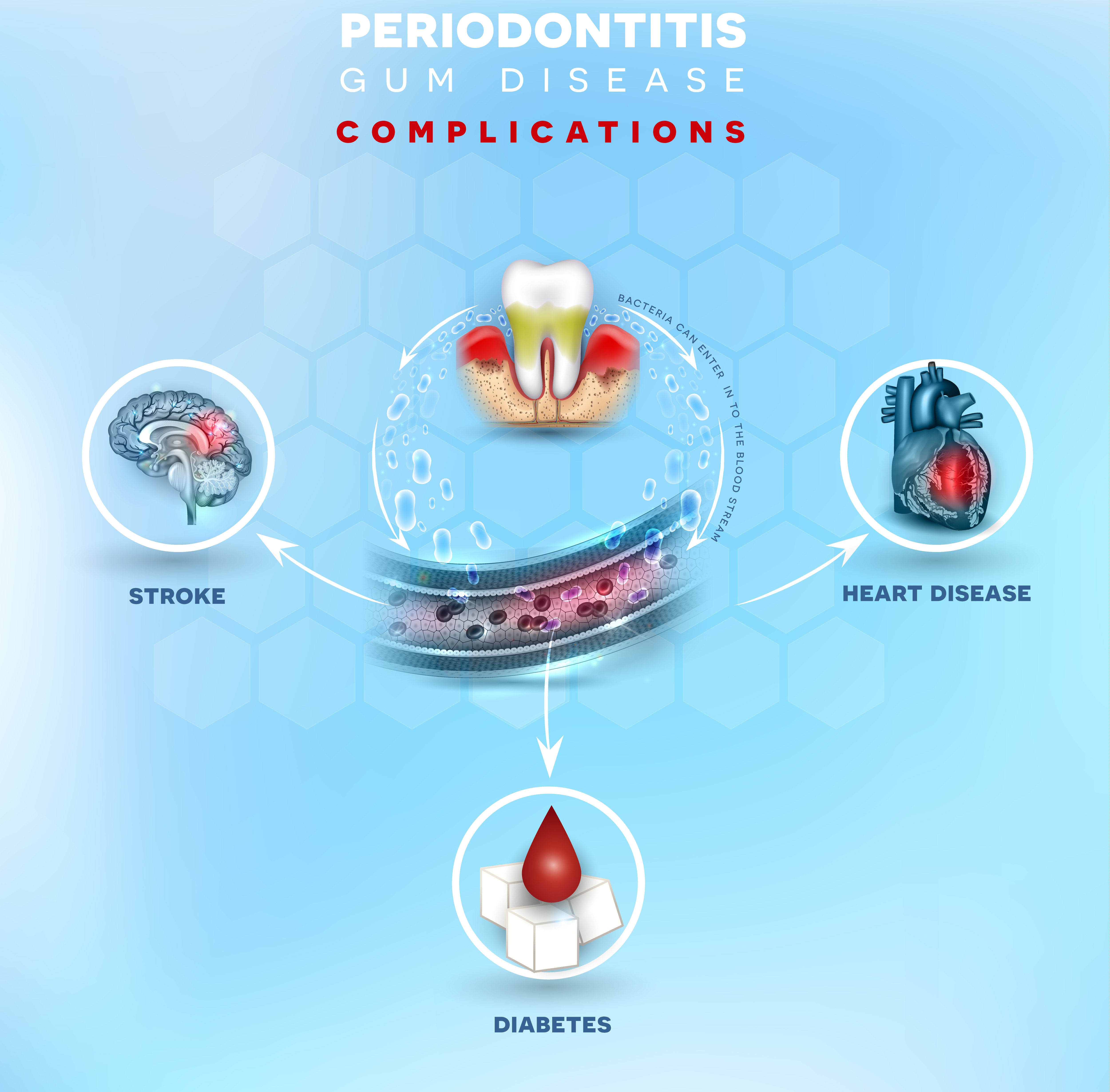
The wider link between heart disease and oral health:
Although researchers were surprised to discover that periodontitis hinders blood pressure medication, this isn’t the first time that poor oral hygiene has been connected to cardiovascular disease in general.
“Over the last decade there is increasing evidence linking periodontal disease with CVD and its adverse outcomes.”
NCBI Journal
Mounting evidence shows that people with periodontitis are twice as likely to have cardiovascular problems. Heart disease and stroke are the biggest killers on the global stage, so this is particularly concerning.
What’s the connection between oral health and heart disease?
Bacteria in the mouth
Bacteria from gum infections travels to the rest of the body via blood vessels – inflaming and damaging the arteries, heart, brain, liver and other organs.
“The current view is that periodontitis leads to entry of bacteria into the circulatory system which in turn activates a host inflammatory response resulting in exacerbation, maturation and, ultimately, atheroma formation thereby increasing the risk of CVD. One study found that among those with established coronary heart disease, periodontal disease increased the likelihood of a recurrent coronary event by nearly 1.5 times.”
NCBI Journal
Low levels of vitamin K2
When people have healthy levels of vitamin K2, calcium is sent to the right destination: their teeth and bones.
However, this doesn’t happen when there’s a deficiency of K2. Instead, calcium builds up where it isn’t supposed to: the heart, veins and kidneys. Too much calcium in these areas can harden and narrow the blood vessels, creating dangerous levels of calcification.
“When your body doesn’t have sufficient vitamin K2 levels, calcium that should be deposited in your teeth and bones can build up in other areas. This eventually becomes problematic.”
Dr Steven Lin
This means that people with a vitamin K2 deficiency are susceptible to both gum and heart disease. Their teeth and bones become weak and their chances of developing heart disease are high.

How to protect your heart by taking care of your mouth
“The surgeon’s secretary rang me and said the doctor would like you to go see a dentist to make sure there’s no infection in the gums and that… about a week before [cardiac surgery]. I was amazed with that. I’m on the phone going what? Dentist? What for? You know I’ve got sore heart not sore teeth. I was shocked. Yeah, I didn’t know”
(Tony, male, 49 years).
A recent Australian study suggests that most cardiovascular patients don’t realise there’s a link between heart disease and oral health.
There’s a concerning lack of education in this area. Dentists need to warn their patients that having periodontitis increases their chances of developing serious cardiac problems that cost people their lives. Cardiac care clinicians also need to be trained to promote oral health, and it’s vital that people with cardiovascular disease are able to access affordable dental services.
If you’re reading this article:
Please remember that you have the power to support your cardiovascular health,, by taking care of your mouth so you never have to deal with periodontitis. Prevention is better than cure.
Here’s what you can do:
Brush and floss your teeth regularly
You need to brush your teeth twice a day and floss at least once to remove built-up particles. A fluoridated toothpaste is best. This article explains what the fluoride levels should be for adults and children.
We recommend a soft-bristled toothbrush with a flexible neck that can access far-to-reach places.
Alternatively, an electric toothbrush delivers a powerful clean – and children enjoy the touch of novelty that it adds to their daily routine.
Every time you brush your teeth, you should devote at least two minutes to the task.
The Australian Dental Association has this guide:
You should clean your teeth systematically, starting at the back of your mouth with the toothbrush bristle at the gum line on a 45° angle, brushing gently in a circular motion. If you scrub too hard from side to side, you can run the risk of causing your gums to recede, as well as damaging the tooth enamel. You should take care to brush carefully along the inner, outer and chewing surfaces, making sure you tip the toothbrush so you can reach the inner front areas of the teeth, which are often missed.”
Less sugar
The main culprit behind tooth decay is a bacteria called Streptococcus. These bad bugs thrive when large amounts of sugar are consumed.
Enjoy sweet foods and beverages in moderation! And make sure you clean your teeth properly, if you can’t resist the occasional indulgence.

Eat more of these foods to prevent decay
Certain foods populate your body with healthy microbes, which help to guard your teeth against decay.
You can’t go wrong with wholesome foods that are rich in probiotics:
- Sour pickles
- Fermented olives
- Cheese
- Sauerkraut or kimchi
- Yoghurt
- Milk or water kefir
- Sourdough bread
- Miso
- Tempeh
- Enhanced milk
Also, get more vitamin K into your body! This will help to strengthen your teeth, gums and cardiovascular system.
Food sources that contain high levels of vitamin K2:
- Eggs
- Grass-fed dairy
- Kimchi, sauerkraut, kefir and other fermented foods
- Eggs
- Cheese
- Goose and chicken liver
Leafy greens, apples, carrots, celery and almonds are also full of minerals, fibre and vitamins that help to protect your teeth.
Don’t smoke and drink less alcohol
Smoking dries out your mouth, stains teeth and causes bad bacteria to stick around. This increases your risk of developing gum disease and oral cancer.
Heavy drinkers are in the same boat, as a result of the high levels of plaque lingering on their teeth.
Avoid “catching” tooth decay
We now know that cavities are contagious. This means that tooth infections can spread from one person to another, along with their saliva.
To stop this from happening, don’t use the same utensils or toothbrushes as other people, even family members. Don’t kiss others near their lips, if they have active tooth decay.
Visit your dentist regularly
It’s in your best interest to visit your dentist for checkups and deep cleaning, to keep your mouth in optimal condition.
Remember:
Early forms of gum disease can be reversed, if caught in time. This increases your chances of protecting your cardiovascular system.
It’s also important to instill good dental habits into your children from a young age, to help them avoid a lifetime of health issues. If they’re aged between two and 17, you may be eligible to receive up to $1000 to cover their private or public dental services over a two year period.
Our staff at Mona Vale Dental are experienced at preventing and treating gum disease and tooth decay. Early intervention is key!
Please contact us on (02) 9997 1100 to book an appointment or find out more.

